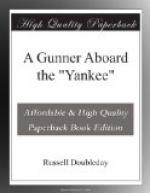The guns of the fleet were working havoc in the forts ashore, and we could see the Spanish artillerymen abandon battery after battery. Cayo, Punta Gorda, Estrella, and Catalena were rapidly being vacated. The former was entirely out of the fight, and the others were replying only at intervals. Presently the “Massachusetts” and “Marblehead” advanced within two thousand yards of the Estrella fortification and began such a terrific firing that within a few minutes a great cloud of smoke appeared above the works. The Spanish guns became quiet at once, and a rousing cheer went up from the fleet.
“Hay,” in his exuberance, wanted to send a five-inch shell from our gun at the burning fort, but the distance was too great and he was compelled to be content with a couple of well-aimed shots at the nearest battery.
“I wish we had thirteen-inch guns and the range was about ten feet,” grumbled “Stump.” “I’d like to smash the whole outfit in a pair of minutes. By Cricky! we have poured enough good old American steel into those forts to build a bridge across the Atlantic, but the dagoes are still giving us guff.”
“It won’t last much longer,” said Tommy reassuringly. “From the looks of those batteries they haven’t much fight left. I’ll bet a hardtack against a prune we haul off at four bells.”
“Licked?” queried Flagg.
“Nope.”
“Will the Spaniards give up?” asked “Dye.”
Tommy hesitated before replying. It was a brief lull and we were resting at the gun. The crew, grimy, dirty, battle-stained and tired, was glad to lean against the side of the deck or a convenient stanchion. Tommy’s long service in the regular navy as apprentice and seaman made his opinions official, and we were always glad to listen to his explanations.
“Will the Spaniards give up?” repeated “Dye.”
“Yes, and no,” replied the first captain thoughtfully. “You see, it’s this way. Those dagoes are not fools by any means. They have selected good places for their batteries, and they know earthworks are hard to destroy. They aren’t like the old-style stone forts that could be knocked to pieces in no time. When a shell, even a thirteen-incher, hits a mound of earth it tears up the dirt and spoils the look of the parapet, but it really doesn’t do much harm. To completely ruin an earthwork battery, you must dismantle every gun in it. And that’s pretty hard to do. Mark my words, those fellows will give us a shot of defiance after we quit.”
“What’s the idea of all this bombarding then?” asked “Stump.” “We’d be much better ‘caulking off,’ seems to me.”
“And think what it costs the Government,” I suggested. “The cost of the projectiles and the wear and tear to guns and ships must be something enormous.”
Tommy’s answer was drowned in the thundering roar of the “New York’s” battery, which opened fire just then a short distance away, but it was evident he agreed with me. A moment later Number Eight went into action once more, and we worked the breechloader without cessation until the conclusion of the bombardment, which came a half hour later.




